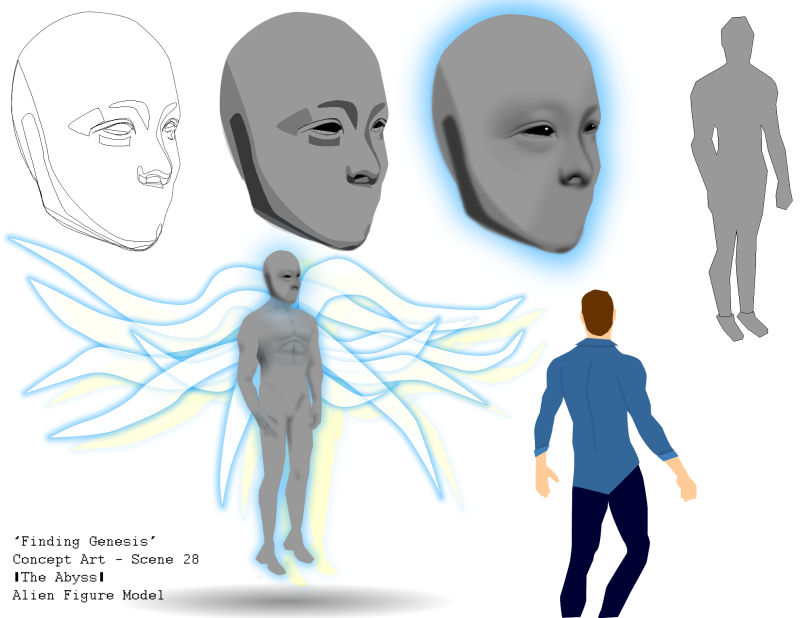 Here is some concept art for the alien encounter scene in 'Finding Genesis'. This is what the alien figure is predicted to look like, although he will end up as less of a physical humanoid--as in made up of energy. There will be three of these glowing figures, each with "wings of light" and pitch black eyes. The screenplay describes them as angelic. The man in the lower right is the main character, Ben, played by Austin Mooney.
Here is some concept art for the alien encounter scene in 'Finding Genesis'. This is what the alien figure is predicted to look like, although he will end up as less of a physical humanoid--as in made up of energy. There will be three of these glowing figures, each with "wings of light" and pitch black eyes. The screenplay describes them as angelic. The man in the lower right is the main character, Ben, played by Austin Mooney.Saturday, February 26, 2011
Concept Art 'Finding Genesis'
 Here is some concept art for the alien encounter scene in 'Finding Genesis'. This is what the alien figure is predicted to look like, although he will end up as less of a physical humanoid--as in made up of energy. There will be three of these glowing figures, each with "wings of light" and pitch black eyes. The screenplay describes them as angelic. The man in the lower right is the main character, Ben, played by Austin Mooney.
Here is some concept art for the alien encounter scene in 'Finding Genesis'. This is what the alien figure is predicted to look like, although he will end up as less of a physical humanoid--as in made up of energy. There will be three of these glowing figures, each with "wings of light" and pitch black eyes. The screenplay describes them as angelic. The man in the lower right is the main character, Ben, played by Austin Mooney.Wednesday, February 16, 2011
Marxist and 'The Matrix'
'The Matrix', directed by the Wachowski broth-... the Wachowskis, is an ideal representation of the social construct proposed by Karl Marx. Marxism1 describes our economic and socio-political build, how the struggle between classes historically brings social change, and calls for revolution from the proletariat. As citizens, we have a veil of false consciousness which blinds us from the true nature of our class with the belief that we can move upward to a higher class if we work hard and follow the system. Horkheimer and Adorno's similar ideologies are of dominance and social hierarchy being fueled by the industry that is culture. 'The Matrix' represents these ideologies metaphorically through its clever story telling.
The premise of 'The Matrix'2 is that robots, in order to survive, harvest humans like batteries and have put them under a false consciousness to sustain them. This reflects how our increasingly mechanistic society is reliant on the proletariat doing their job as part of the system. For the system to work, the citizens must remain under this false consciousness otherwise they'll reject the oppression brought on by the dominant class (robots). The dominant class needs the proletariat to be falsely conscious so that they, the lower-class, aspire to the dominant class and view it as a good thing and as a necessity. If the proletariat were to come out of this zombie trance... well... let's just clarify that the word "Apocalypse" is Greek for "The Unveiling".
Revolution is what is required to have social change. Neo meets the group of enlightened revolutionists and they offer to unveil him. In the process of being awaken, Neo faces a mirror. A likely reference to Lecon's Mirror Stage. Neo sees himself as he is in the matrix. A representation of his ideal self. A split-subject. But he is soon awaken to the "real world", where he sees his real self for the first time after the veil of false consciousness is lifted. In the real world, the true nature of their oppressor is clear—power and control over the human race. To the humans of the real world the matrix is nothing more than binary characters encoded and decoded, like Hall's theory, onto a computer.
Cypher has a very important perspective on the situation. "Ignorance is bliss," he says. If we are falsely conscious, do we really want to be awaken? Is the truth better than the lie? If society is as it was before the robots took over, what is the issue? As sentient beings, we're not okay with being controlled. If we know about it, we can not just ignore it entirely. Cypher wanted to forget or to never have known the truth. Knowing is not enough to overcome the oppression. There has to be a successful revolution because until there is change, the citizens will reject or ignore the issue.
Agent Smith offers another key perspective. The original matrix was designed as a perfect world. Agent Smith explains that the citizens rejected the utopia matrix. They were unable to accept it as true, and as a result—entire crops of human battery power were lost. This is very much true in the real world. Humans have the capability and means of creating a utopian society, yet they haven't. Utopian socialism, as proposed by Marx, is an model that has yet been perfected. The aim is not necessarily to create the perfect society, but to create a rational social and economic system based mainly on socialism. It is possible that our false consciousness causes us to reject a perfect world because it is meant to blind us from what the world could be in addition to what the world is.
Horkheimer and Adorno3 say that the culture is like an industry producing goods which manipulate people into passivity. Popular cultural goods—like movies, music and most things media related—only contribute to the false consciousness of the proletariat because it makes them content with the difficulties of their economic situation. This need to feed into the culture industry, which supports and makes capitalism possible, replaces actual human needs like freedom, creativity and happiness in the subjects’ minds. Horkheimer and Adorno considered this a danger to fine arts, which today includes cinema. “Hollywood” cinema gives into the culture industry by producing films which only add to this veil.
It’s a bit of a contradiction to this idea that the Warner Bros. produced movie, ‘The Matrix’, should call this false consciousness to its audience’s attention. The film has a lot of elements of an independent film which gives it the essence of higher art cinema and not just an ordinary money-making blockbuster.
The Wachowskis also directed ‘V for Vendetta’ which directly places the blame for the oppression of the proletariat on its corrupt government, so it is safe to say that the Wachowskis speak out on cultural issues and the premise of ‘The Matrix’ being related to cultural constructs like Marxism is not just a coincidence. “Matrix” is even an anagram of the word “Marxist” minus the letter s. With references to Lecon, Hall, Horkheimer and Adorno—the film is a clear metaphorical expression of the Marxist ideology.
Sources:
1. Practices of Looking: An Introduction to Visual Culture, Marita Sturken & Lisa Cartwright. Oxford University Press; 2009.2. The Matrix, The Wachowskis. Warner Bros. Studios, 1999.
3. Dialectic of Enlightenment, 'The Culture Industry: Enlightenment as Mass Deception', Horkheimer and Adorno. Frankfurt School, 1947.
Saturday, February 12, 2011
IMDb Official
This occurred as part of a WithoutaBox deal, a page for my film and all its contributors would be made for submitting my film to the San Fransisco LGBT film festival--which I have no delusions of getting into and only did it because it was free. Doing so did pay off with this fancy IMDb page!
Now here is my dilemma. How will I know if I've become famous? Will it be the day I no longer have to eat Ramen noodles and peanut butter? Perhaps now... the day will never come.
__________________
In other news, I sent out a Crew Call which means any day now 'Finding Genesis' will official be in production! Starting a little earlier than expected to make sure we finish on time. Draft 1 of the screenplay is complete, now I just have to make it not suck.
Thursday, February 3, 2011
Petition to Reinstate the Iowa Film Office
From the Iowa Motion Picture Association:
The IMPA is dedicated to the pursuit of reinstating the Iowa Film, Television and Video Promotion Program due to our belief that the program provides a positive economic impact to our state and that the reasons for creating the program are still as relevant today as they were in 2007.
The Iowa Motion Picture Association has actively advocated for the suspension to be lifted. We continue to be optimistic about the future of the program and will advocate for a program that provides a net economic gain and maximizes cultural and social benefits to the state of Iowa while encouraging growth of the Iowa Production Industry.
For more information about the program, visit our Incentives page.
Please contact your state legislators and the Governor and ask them to support the Iowa Film, Television and Video Promotion Program and share the IMPA's talking points, economic snapshot and program recommendations document.

